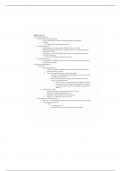History (Lecture 1)
What do psychologists do?
● Clinical and counseling psychology
○ Clinical and counseling→ based on research and methods to help people
○ Psychiatry
■ Medical school, drugs, Freudian tradition
● Applied psychology
○ School psychology→ helping schools or helping within schools (kids)
○ Industrial/organizational psychology→ helping businesses (ex: choosing leadership) or
universities or military
○ Human factors→ a type of psychology where people interact/design everyday objects
(ex: doors and software)
■ Ex: a stovetop and the organization of the eyes
● Research psychology
○ Cognitive (the act of knowing or perceiving), neuroscience (science of the brain), social,
developmental, personality
History (short and incomplete)
1. The Greeks
a. Socrates (469-399 B.C.)
i. The Socratic method of teaching→ drawing knowledge out of students, asking
them and waiting for response
ii. Nativism, reincarnation, and the recycling of knowledge
1. nativism→ your beliefs/behaviors/skills/abilities are born into you “hard
wired into the brain at birth”
2. Does a mind end? Does a mind begin? Socrates believed no- that the
brain is a recycled a hard drive
a. He believed you can’t created a mind out of nothing→ install the
software into the brain, add memory to the hard drive, and then
it’s recycled so that your lifetime of knowledge is continuously
added on
b. Aristotle (384-323 B.C.)
i. Student of Plato (who was a student of Socrates) → rejects
nativism/reincarnation/recycling, believes in...
ii. Empiricism→ all knowledge comes from experience
iii. Tabula rasa→ “blank slate” when you are born
2. Rene Descartes (1596-1650, France)
a. Positivism→ the belief that you should only accept something as a fact if you are positive
it’s true (no room to doubt it)
i. 3 facts
1. I think therefore I am
2. Space definitely exists (XYZ coordinates, Cartesian planes)
, 3. If objects exist, they can me through space, the idea of motion
4. *SOMETIMES* Catholic faith as truth
b. Reflexes and the statues in the garden→ what he thought reflex was based on, physical
pressure, Descartes sought to explain reflexes mechanistically in both humans and
animals
c. Dualism and the difference between people and animals
i. He also distinguished between humans and animals by assigning a mind only to
humans. Animals, he believed, had no minds and behaved exclusively as the
result of mechanistic principles (Are humans/animals hydraulic machines?)
ii. Dualism→ Descartes attempt to redefine reality, concludes that there are two
worlds: the physical world (dimensions of height, weight, mass, etc.) and the
mental world (completely separate because it can’t have same dimensions as
mental world, animals DON’T have this)
1. Dualism translates today (mental health v. physical health, mental error v.
physical error in sports)
iii. Materialism→ only believing the physical world is real
d. Nature and Nurture
3. The British Empiricists
a. John Locke (1632-1704) and David Hume (1711-1776)
i. Empiricism/Associationism
1. “All knowledge comes from experience”
2. Associationism→ putting things together in your mind building up from
the smallest units of creation
3. Political Ramifications→ John Locke’s influence on the revolutionary
war, on the side of the revolution (his idea of rights to life, liberty, and
property), also idea of all knowledge comes from experience...no
monarch could have enough experience to understand the problems of a
nation)
4. Immanuel Kant (1724-1804, Germany)
a. Believes in concepts that couldn't be built from experience/learned (abstract)
i. Self→ identity, you can’t know that you are an entity
ii. Justice→ you can learn the rules of society but you can't learn that an outcome is
right/just, you can’t learn right and wrong from experience
iii. Causation→ you can't have a sense that one thing causes another
b. These notions and others make up the mental world
c. Can these things be studied by scientific means? Kant says that the mental world can not
be studied by scientific means (Newton’s laws) like the physical world can
d. Disagrees with empiricism, supports dualism (two worlds of mind and body)
5. Wilhelm Wundt (1832-1920)
a. Establishes psychology as experimental philosophy (1879 in Leipzig, Germany) → father
of psychology because he came up with the word
, b. Establishes psychology as the science of the mental world
c. Introspection→ looking within, sitting people down and having them think about their
mental consciousness
d. Structuralism→ starting with small things and building up to form a big structure
6. William James (1842-1910)
a. American, work with Wundt
b. Psychology should aim at “the practical prediction and control of behavior”
c. American functionalism→ (alternative to structuralism) mental life and behavior in terms
of active adaptation to a person’s environment
d. Idea of stream of consciousness→ consciousness has no structure, it’s always changing
e. Believed that theorists never applied their ideas to real world sciences and he wanted to
change that
f. Mary Witt Calkins and women in psychology→ couldn't get her PhD at Harvard because
she was a woman, worked with William James
7. John B. Watson (1878-1958) and B.F. Skinner (1904-1990)
a. Behaviorism: psychology as the science of behavior
b. The “Behavior Manifesto”: psychology should be about behavior, not the mind
i. Watson University, Chicago
ii. Work with rats running through tunnels
iii. Little Albert experiment
1. Showed a little boy a rat and he wasn’t scared, then presented the rat with
a loud noise multiple times and he cried, then when the little boy was
presented with the rat he was scared (because rat was associated with
loud noise)
c. Based on classical and operant conditioning (Pavlov)
8. The Cognitive Revolution (1959-)
a. The mind as a computer
i. Negating Skinner’s studies, they want to study the mind in relation to memory,
personality, and mental illness
ii. Behaviorism collapsed
b. The liberalization of psychology
i. Now, there are many approaches
A Dichotomy That’s Been Running Throughout
Nature (inside from birth) Nurture (acquired from outside)
Socrates’ inherited knowledge Aristotle’s tabula rosa and associations
Descartes’ soul Descartes’ reflex stimuli
Kant and innate ideas British empiricists and learned associations




